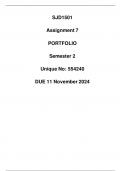SJD1501
Assignment 7
PORTFOLIO
Semester 2
Unique No: 554240
DUE 11 November 2024
, Reflections on Law and Justice
Introduction
The completion of this module marks the beginning of my journey toward understanding
the intricacies of the justice system. It has provided me with a robust foundation to
reflect on essential concepts, including the impact of social media on privacy rights, the
detrimental effects of corruption on public service delivery, strategies against gender-
based violence (GBV), the incorporation of Ubuntu in the criminal justice system, and
the significance of ethical role models. By synthesizing my insights from this course, I
aim to develop a personal philosophy of justice that underscores my understanding of
law, the justice system, and the individuals dedicated to upholding these principles in
our society.
The Impact of Social-Media on the Constitutional Right to Privacy
1.1 Privacy as a Fundamental Right
Privacy is an invaluable aspect of a person's identity and dignity. In South Africa, this
right is enshrined in Section 14 of the Constitution and is supported by common law.
However, the advent of social media has significantly altered the landscape of pri vacy.
Platforms like Facebook, Twitter, and Instagram facilitate the easy sharing of personal
information, creating a blurred line between public and private life. As users willingly
share intimate details, the risk arises that this information may become public without
consent, leading to potential misuse of personal data. Furthermore, the rapid
advancements in technology compound these privacy challenges, exposing individuals
to risks that compromise their personal security.
1.2 The Right to Freedom of Expression
Social media serves as a potent vehicle for exercising the constitutional right to freedom
of expression. It provides individuals with the means to articulate their opinions,
disseminate information, and unite for various causes on a global scale. However, this
freedom is accompanied by complexities, such as the proliferation of misinformation,
hate speech, and cyberbullying. The open nature of these platforms necessitates a
delicate balance between safeguarding free expression and regulating harmf ul content.
While social media amplifies diverse voices, it also calls for responsible usage and
effective oversight to prevent potential abuses of this fundamental right.
Additionally, social media assumes a dual role in shaping our collective consciousness.
It enables connectivity but demands a careful equilibrium between virtual interactions
and real-life relationships. Despite potential adverse effects on freedom of expression,
social media also provides opportunities for countless individuals to voice their opinions
and positively influence many lives.




